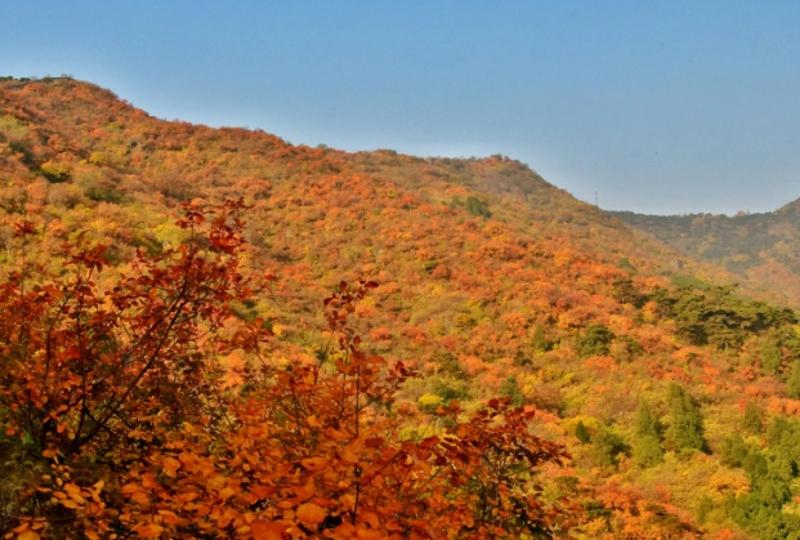The Splendor of Fragrant Hills Park: A Royal Garden Oasis in the Mountains
Fragrant Hills Park in Beijing, located at the foot of the Western Hills in Haidian District, is a mesmerizing royal garden nestled amidst lush mountains and forests. Its unique natural landscapes and rich historical culture attract countless visitors to explore its wonders. Here are several highlights of Fragrant Hills Park:

Reference: Beijing Fragrant Hills Park: Harmony of Nature and History
1. Lush Forests:
Fragrant Hills Park is renowned for its lush forests, with dense trees covering the slopes, creating a refreshing and pleasant atmosphere. Stepping into the park feels like entering a verdant world, far away from the hustle and bustle of the city.
2. Hidden Cultural Relics:
The park not only features dense forests but also hides many ancient relics and historical sites. Strolling through, visitors can discover ancient buildings, remnants of ancient roads, and historical stone tablets, all bearing witness to the park's long history and cultural heritage.
3. Scenic Spots:
As one of Beijing's scenic spots, Fragrant Hills Park boasts numerous viewpoints offering breathtaking views of the capital city. Standing at the heights of Fragrant Hills, visitors can overlook the entire panorama of Beijing, especially captivating on clear days.
4. Natural Oxygen Bar:
Known as Beijing's natural oxygen bar, Fragrant Hills Park offers fresh air and beautiful surroundings. Visitors can breathe in the fresh air, relax, and appreciate the blessings of nature.
5. Autumn Red Leaves:
One of the park's highlights is the "Crimson Maple Leaves of Xiangshan." During the autumn season, the entire park turns fiery red, with maple leaves resembling a colorful painting, attracting numerous visitors and becoming one of China's and even the world's renowned landscapes.
In conclusion, Fragrant Hills Park is celebrated for its forested landscapes, cultural relics, scenic viewpoints, and autumn red leaf spectacle. It is a must-visit destination for tourists in Beijing and an ideal place for leisure, exercise, and scenic exploration.
Question 1:What are some of the key features that make Fragrant Hills Park in Beijing famous?
Answer: Fragrant Hills Park is renowned for several reasons. Firstly, it boasts lush forests that create a refreshing atmosphere, providing visitors with a serene escape from urban life. Secondly, the park houses hidden cultural relics, including ancient buildings, remnants of old roads, and historical stone tablets, which offer insights into its rich history and cultural heritage. Additionally, Fragrant Hills Park is a scenic spot with viewpoints offering panoramic vistas of Beijing, particularly captivating on clear days. Moreover, it serves as a natural oxygen bar, providing fresh air and beautiful surroundings for visitors to relax and rejuvenate. Lastly, the park's autumn red leaves spectacle, known as the "Crimson Maple Leaves of Xiangshan," attracts numerous visitors during the fall season, making it a renowned landscape both in China and globally.
Question 2: Who are some significant figures associated with Fragrant Hills Park in Beijing?
Answer: Fragrant Hills Park has historical connections with several notable figures. One such figure is Sun Yat-sen, revered as the "Father of the Nation" in China, whose memorial hall is located within the park. Sun Yat-sen had a significant impact on modern China's democratic revolution and often retreated to Fragrant Hills for contemplation. Another figure is Emperor Qianlong of the Qing Dynasty, who ordered the expansion and renovation of the park, transforming it into a magnificent royal garden. Furthermore, the renowned architect I. M. Pei designed the Fragrant Hills Hotel, which stands as a symbol of cultural integration, blending Western architectural techniques with traditional Chinese imperial style. Additionally, local experts Yang Zheng and Sun Huilin frequently organize guided tours of Fragrant Hills Park, providing visitors with insights into its history, culture, and scenic highlights.
note: This return of all, without the author's permission, may not be reproduced